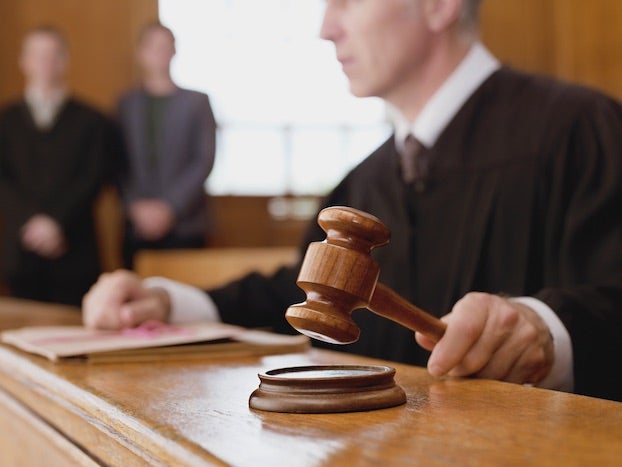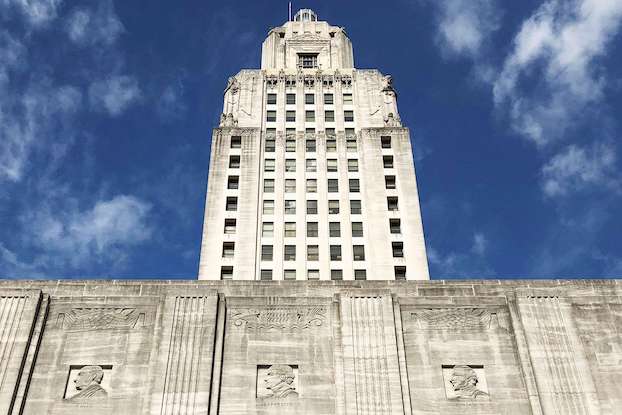Informer: Parish to inform prayer leaders of courts’ meeting invocation criteria
Published 12:10 pm Monday, November 7, 2011
The Calcasieu Parish Police Jury and the Lake Charles City Council both say an “invocation” at the beginning of their meetings. I call it a prayer. Should citizens be subjected to praying at public government meetings? Federal courts have generally found that prayers delivered before public meetings — whether said by officeholders or visiting clergymen — are constitutional if they adhere to the following criteria: They’re nonsectarian. They don’t mention “Jesus,” “Jesus Christ,” “Christ,” “Our Savior” or a saint — though they may mention “God” or “the Almighty.” They don’t invoke one religion in preference to others. They’re directed only at the board members themselves. They precede public business and aren’t a part of public business. The City Council’s meetings aren’t available for viewing online, but those of the parish panel are. The Informer reviewed all regular meetings of the Police Jury from the last couple of years — two are held each month — and found that only five invocations met most or all of the above criteria. The panel’s pre-meeting prayers were usually offered “in Jesus’ name,” or they referred to “Jesus the Christ.” One prayer called on “the God of Abraham, Isaac and Jacob,” and another addressed “the one true God.” One invocation, offered Nov. 4, 2010, by a Catholic deacon, repeatedly invoked Christ; included a reading from the biblical book of Ephesians; and was explicitly directed at the audience, as well as the panel. The prayer, a departure from the norm, lasted three minutes. “In the name of the Father, and of the Son and of the Holy Spirit. Amen,” it began. “The grace of our Lord Jesus Christ and the love of God and the fellowship of the Holy Spirit be with you all. Brothers and sisters in Christ, we come together in prayer and praise as people who believe in the one lord and Savior Jesus Christ and share in one baptism for the forgiveness of sin. We also acknowledge that our unity and faith needs to be nourished and deepened through our prayer, work and study together. May unity among Christians become ever more perfect.” In most cases, audience members were asked to stand and bow their heads for the prayers, and no invocations were ever offered by non-Christians.
MARSH V. CHAMBERS
Federal appeals courts, including the 5th U.S. Circuit in New Orleans, have used Marsh v. Chambers, a 1983 U.S. Supreme Court case, as their guide on the question of invocations at public meetings. The case involved daily prayers delivered by a Presbyterian minister before the Nebraska Legislature. The minister, the Rev. Robert Palmer, had for 16 years served as the legislature’s chaplain, a post that earned him a small monthly stipend. Ernie Chambers, a state senator, objected to the practice, which since 1980 had involved prayers that made no mention of Christ — an accommodation Palmer made after a Jewish legislator complained. The high court, in a 6-3 decision, decided the invocations were constitutional, citing, in part, the long history of their use in Congress and state assemblies. “The content of the prayer is not of concern to judges where, as here, there is no indication that the prayer opportunity has been exploited to proselytize or advance any one, or to disparage any other, faith or belief. …,” Chief Justice Warren Burger wrote in the majority opinion. “The unbroken practice for two centuries in the National Congress and for more than a century in Nebraska and in many other states gives abundant assurance that there is no real threat ‘while this Court sits.’” In a lengthy dissent, Justice William Brennan said the practice of praying before legislative meetings entangled government in religious affairs and was unconstitutional. “Prayer is serious business — serious theological business …” he wrote. “Some might object even to the attempt to fashion a ‘nonsectarian’ prayer. … Some would find a prayer not invoking the name of Christ to represent a flawed view of the relationship between human beings and God. … “We are faced with potential religious objections to an activity at the very center of religious life, and it is simply beyond the competence of government, and inconsistent with our conceptions of liberty, for the State to take upon itself the role of ecclesiastical arbiter.”
NO COMPLAINTS
The Informer asked the parish and city administrators about the guidelines the panels have for the invocations and the selection of prayer leaders. “A rotation system is used whereby the police jurors take turns inviting someone from the community to offer the invocation, typically clergy, or they may choose to give the invocation themselves,” Parish Administrator Bryan Beam wrote in an email. “There is no set formula for this process, or how people are selected.” John Cardone, the city administrator, said the council president “randomly selects the prayer leader, be it a fellow council member, the mayor, or sometimes a person from the audience, usually a reverend.” Both men said no one has complained about the invocations, which they said have been done the same way for years. The Informer forwarded to both administrators links to Marsh v. Chambers and a 5th U.S. Circuit Court decision on prayer before Tangipahoa Parish School Board meetings. It also sent the above criteria. In response, Beam said the parish will now provide court-derived guidelines to those who lead the invocations at future Police Jury meetings. Cardone said he forwarded the material to the city’s legal department and would follow up with the Informer next week. • Online:
;
.
The Informer answers questions from readers each Sunday, Monday and Wednesday. It is researched and written by Andrew Perzo, an American Press staff writer. To ask a question, call 494-4098, press 5 and leave voice mail, or email





